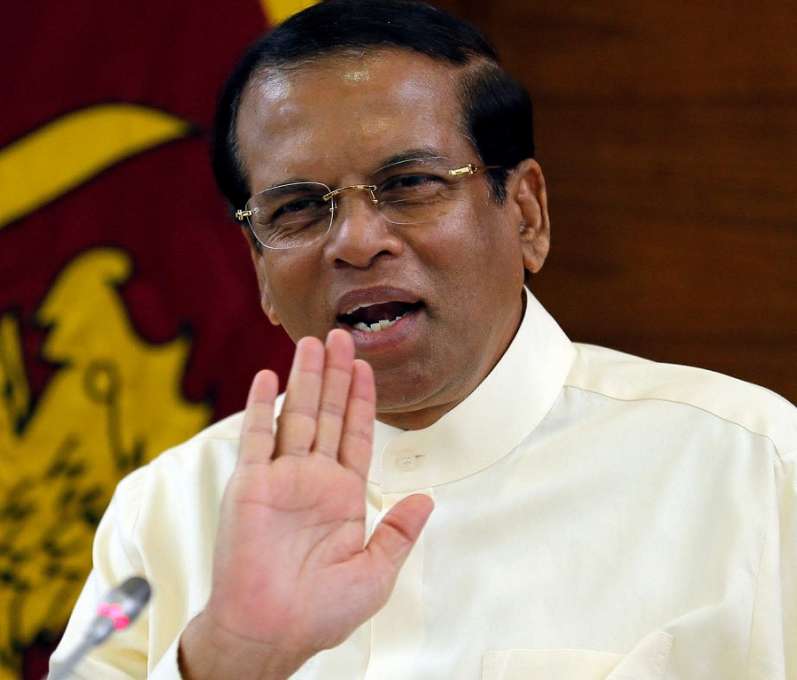 Sri Lanka is back in the geopolitical spotlight ahead of elections slated for later this year, and former President Maithripala Sirisena says Washington should be paying attention.
Sri Lanka is back in the geopolitical spotlight ahead of elections slated for later this year, and former President Maithripala Sirisena says Washington should be paying attention.
Outside powers — specifically China — are exerting influence amid what Mr. Sirisena says is a moment of “great instability” for his country, a teardrop-shaped island just off India‘s southeastern coast that has become entangled in great power politics between Washington and Beijing in recent years.
Mr. Sirisena, who was president from 2015 to 2019, emphasized during a meeting with The Washington Times that his country’s citizens are enduring “abject poverty” trying to recover from a crippling foreign debt crisis, soaring inflation, a contracting economy and shortages of food, fuel and other basics.
The former president said his goal in visiting Washington this week — a trip that included a meeting with Deputy Assistant Secretary of State for South and Central Asian Affairs Afreen Akhter — was to inspire deeper bilateral cooperation and spur greater U.S. support for Sri Lanka.
“The main objective of this visit is to convince the State Department to save Sri Lanka from that situation and work together,” Mr. Sirisena said.
The Biden administration has announced roughly $300 million in aid for Sri Lanka, including loans for small businesses, since the severe economic downturn that began in 2022. But the geopolitics surrounding the aid are complex in a country of 22 million still recovering from a brutal quarter-century civil war that only ended in 2009.
U.S. officials point to Sri Lanka as a case study in the debt trap that can come with participating in China‘s massive “Belt and Road” global infrastructure program, launched in 2017. That was the year Sri Lanka was pressured into effectively selling control of its port of Hambantota to a Chinese state-owned company after falling behind on $1.5 billion in Belt and Road financing.
Sri Lankan officials have also battled with their Chinese counterparts over Beijing’s desire to send submarines and other military ships through Hambantota — seen as a critical location to challenge rival India in and around the Indian Ocean.
The U.S.-China friction of recent years has also been felt in Sri Lanka as well.
Sri Lanka has emerged as a key counterterrorism partner for the United States since a group of Sri Lankans inspired by the Islamic State terror group killed 269 people with six near-simultaneous suicide bombings in Christian churches and tourist hotels on Easter Sunday in 2019.
“There is a lot of cooperation between the current government in Sri Lanka and the U.S. in terms of counterterrorism,” Mr. Sirisena told The Times, who said he hopes the relationship will lead to greater economic engagement from Washington.
The plea comes just months ahead of Sri Lanka‘s presidential election, which is likely to occur in November.
The Associated Press has reported that incumbent President Ranil Wickremesinghe could run again, seeking a mandate for his tough economic stabilization program designed to bring down inflation and restore economic growth.
Mr. Wickremesinghe was elected through a Parliament vote after his predecessor resigned and has faced political headwinds because of his austerity measures. Opposition figures such as Sajith Premadasa and Anura Kumara Dissanayake are likely to be the serious candidates.
The election will be the first held since the economic crisis took hold. Sri Lanka declared bankruptcy and the deep economic contraction that followed triggered protests that caused then-President Gotabaya Rajapaksa to flee and resign.
An IMF recovery program kicked in last year, but opposition members have criticized the program because of the heavy taxes and privatization plans it demands.
Thus, the polls will likely be seen as a referendum on Mr. Wickremesinghe, a career politician who has sought to be the face of a recovering Sri Lanka.
The U.S., China and India — New Delhi has also provided assistance and loans to Sri Lanka — will all be watching for what the election brings. (Courtesy Washington Times)


Post a Comment